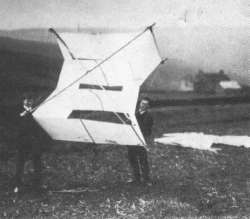
‘Students pay tribute to kite philosopher’ said the headline in the Glossop Advertiser on 20 March. It describes a celebration by ‘fine arts and interactive arts students’ at Chunal, the hill outside Glossop, flying kites to mark the centenary of Ludwig Wittgenstein’s aerodynamics experiments at Manchester University’s Kite Flying Upper Atmosphere Station. Wittgenstein would stay at the Grouse Inn near the top of the hill – and just over another hill from Literary Connection’s own home. He boarded upstairs in a room that looked out on the moors where he often walked alone. The picture shows Wittgenstein and by William Eccles with a kite in the summer of 1908. Whilst at Manchester University, Wittgenstein developed and patented a design for a rotary blade of the kind now used in helicopters – before abandoning engineering for mathematics and then philosophy. On the way he found time to fight in the Austrian army in the First World War and become a school teacher. He hated teaching but wrote a spelling manual, commenting of his students’ reactions to his classroom guide: ‘The orthographic conscience had been awakened.’
 No guests stay at the Grouse Inn today – but, appropriately, it is possible to take helicopter flights from the field at the back, as you can see here.
No guests stay at the Grouse Inn today – but, appropriately, it is possible to take helicopter flights from the field at the back, as you can see here.
‘A good simile refreshes the intellect,’ Wittgenstein wrote in 1929. In 1930 he added: ‘If someone is merely ahead of his time, it will catch up with him one day.’ (Both quotations from Culture and Value.) So were his ideas like flights of fancy that have now caught up with us?
The Advertiser’s headline is preferable to the Glossop Chronicle‘s version of the same story: ‘Ludwig would have been proud!’ Displaying the paper’s penchant for exclamation marks, it also raises the question of whether the journalist felt that local readers are so familiar with the giants of Twentieth Century philosophy that they would at once know who was meant, or that no one would read an article containing the either of the words ‘philosophy’ or ‘Wittgenstein’ – or perhaps simply that ‘Wittgenstein’ was just too long a word for the column?
